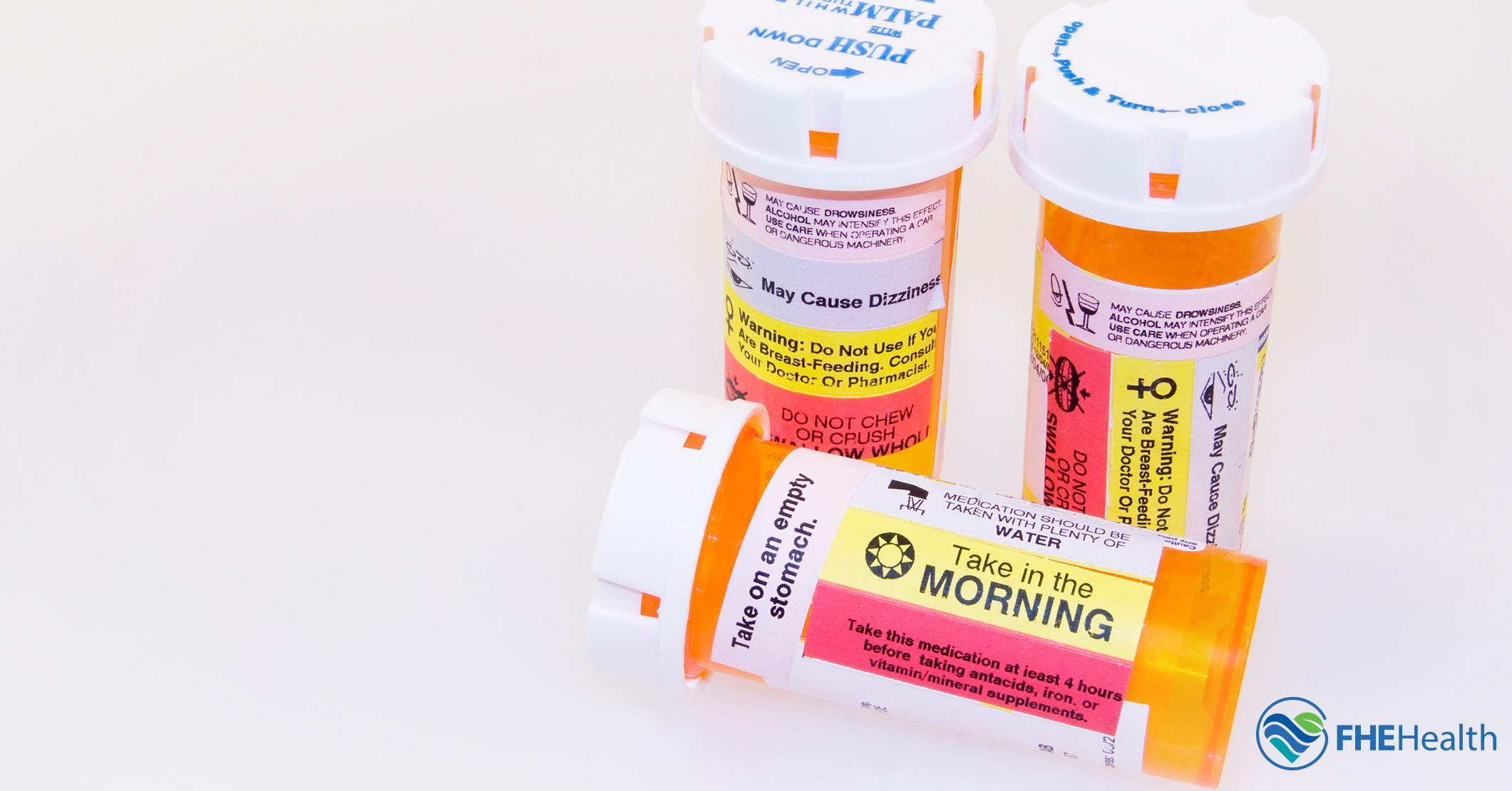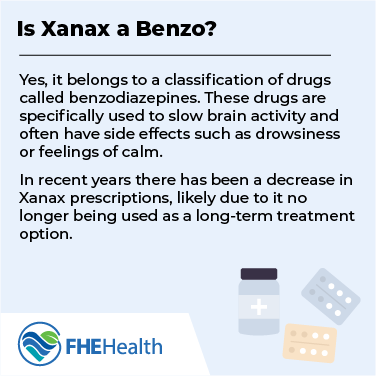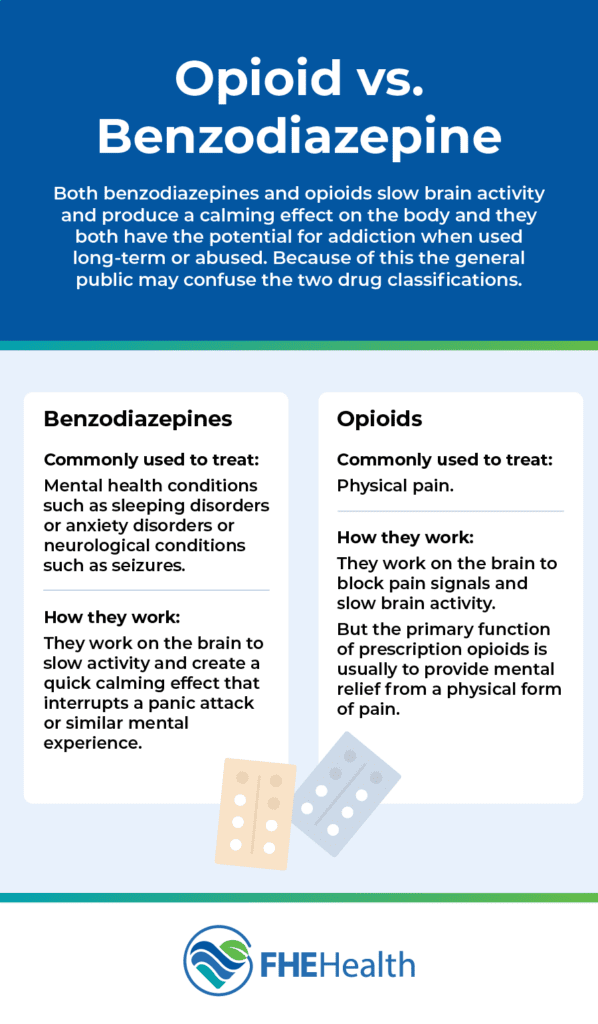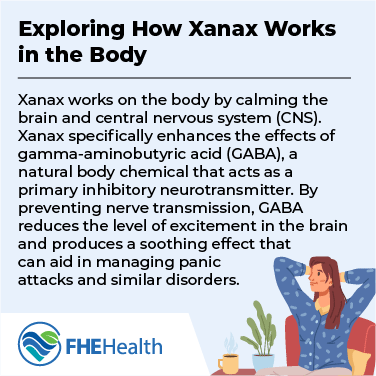
What type of drug is Xanax? Is Xanax an opioid, or is Xanax a benzo? These are important questions that can help you understand what this medication is and how it works.
Xanax is the brand name for the drug alprazolam, which is frequently used to treat anxiety and panic disorders. It was first approved by the U.S. Food and Drug Administration (FDA) for use as a prescription drug in the United States in 1981. Alprazolam works by reducing excitement levels in the brain, which is why it temporarily provides relief to people living with anxiety and panic disorders. Find out how it’s prescribed today and why there’s often confusion about what drug classification Xanax belongs to.
Is Xanax a Benzo? Understanding Its Classification and Purpose
 Is Xanax a benzo? Yes, it belongs to a classification of drugs called benzodiazepines. These drugs are specifically used to slow brain activity and often have side effects such as drowsiness or feelings of calm. Besides being used for treating anxiety and panic disorders, benzodiazepines are often prescribed to people with sleeping disorders.
Is Xanax a benzo? Yes, it belongs to a classification of drugs called benzodiazepines. These drugs are specifically used to slow brain activity and often have side effects such as drowsiness or feelings of calm. Besides being used for treating anxiety and panic disorders, benzodiazepines are often prescribed to people with sleeping disorders.
In 2020, Xanax was prescribed nearly 17 million times in the United States, a significant decrease from 2014, when it was prescribed close to 29 million times. The decrease in Xanax prescriptions can be at least partially attributed to it no longer being used as a long-term treatment option.
Differentiating Opioids and Benzodiazepines: Clarifying the Distinct Drug Categories
The common misunderstanding of whether Xanax is an opioid or a benzo is indicative of the lack of public education surrounding the two distinct drug categories. While benzodiazepines are used to slow brain activity and have a calming effect on the mind and body, opioids are more commonly prescribed to treat physical pain. This is because opioids attach to opioid receptors within cells in various parts of the body (including the gut, brain and spinal cord) to block pain messages. People living with severe or chronic pain may be prescribed opioids to reduce the amount of physical pain their brain perceives them to be experiencing.

Benzodiazepines for Mental Health
Benzodiazepines are a class of drugs that are commonly prescribed for mental health conditions like anxiety and panic disorders. Unlike SSRIs used to treat generalized anxiety disorder (GAD) or social anxiety disorder (SAD), which can take weeks to work on the brain and are therefore taken long-term, Xanax and other benzodiazepines are short-term treatment options. They have a quick onset (anywhere from a few minutes to an hour), and the effects last for a few hours, providing temporary relief from anxiety symptoms or a panic attack.
Opioids for Mental Health
Opioids have historically been used to treat depression and other mental health disorders, but due to the risks of substance abuse and addiction associated with this class of drugs, they’re not the first line of defense. When other treatment options are available (like SSRIs or benzos), physicians are likely to try other prescriptions before resorting to opioid treatments. Besides the potential for addiction and substance abuse, using prescription opioids for longer than 90 days has been associated with an increased risk of developing major depressive disorder and other mood disorders.
One investigation from 2006 published by JAMA Internal Medicine did find that opioid treatment could have positive results in patients with treatment-resistant depression and obsessive-compulsive disorder (OCD), however.
Xanax’s Mechanism: Exploring How Xanax Works in the Body
 Because Xanax is a benzo, it works on the body by calming the brain and central nervous system (CNS). Xanax specifically enhances the effects of gamma-aminobutyric acid (GABA), a natural body chemical that acts as a primary inhibitory neurotransmitter. By preventing nerve transmission, GABA reduces the level of excitement in the brain and produces a soothing effect that can aid in managing panic attacks and similar disorders.
Because Xanax is a benzo, it works on the body by calming the brain and central nervous system (CNS). Xanax specifically enhances the effects of gamma-aminobutyric acid (GABA), a natural body chemical that acts as a primary inhibitory neurotransmitter. By preventing nerve transmission, GABA reduces the level of excitement in the brain and produces a soothing effect that can aid in managing panic attacks and similar disorders.
Potential for Misunderstanding: Reasons Behind the Opioid vs. Benzodiazepine Confusion
Although the purpose of prescribing opioids versus benzodiazepines is very different from a medical perspective, it’s easy to see why the general public may confuse the two drug classifications. Both benzodiazepines and opioids slow brain activity and produce a calming effect on the body. Similarly, both drug types have the potential for addiction when used long-term or abused.
The primary difference between the two lies in how they have these effects on the mind and body. Benzodiazepines are primarily used as a treatment for mental health conditions such as sleeping disorders or anxiety disorders or neurological conditions such as seizures. They work on the brain to slow activity and create a quick calming effect that interrupts a panic attack or similar mental experience.
Opioids are more commonly prescribed to treat physical pain. They still achieve this by working on the brain to block pain signals and slow brain activity. But the primary function of prescription opioids isn’t to manage a mental health condition; it’s usually to provide mental relief from a physical form of pain.
Regardless of whether you’re prescribed benzodiazepines or opioids by a physician, it’s critical to follow the directions of the doctor regarding dosage, how long it’s used and other drug interactions. Both drug classifications have the possibility of developing drug dependencies and causing fatal overdoses if abused.
Seeking Accurate Information: The Importance of Properly Understanding Medications
When seeking treatment for a mental health condition, it’s important to talk to a professional who listens to your experience and works with you to develop a long-term treatment plan. Drug education is essential to empowering patients and allowing them to have a voice in their journey to recovery.
At FHE Health, we have a team of counselors available 24/7 to take your call and discuss various treatment options with you. Based on your symptoms and needs, we can help you develop a treatment plan that includes inpatient care, outpatient care, medications or group therapy. Contact us today to get started.






